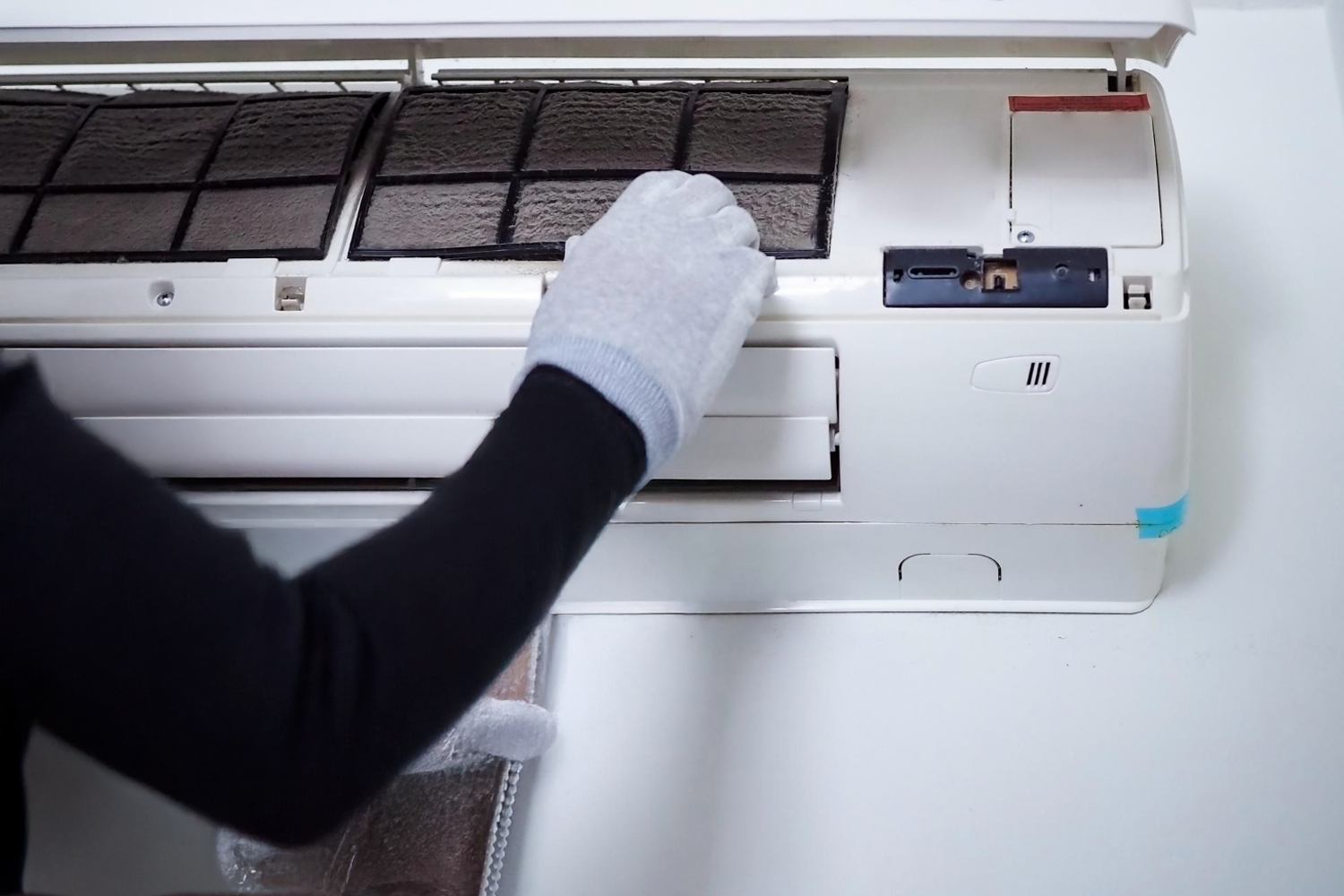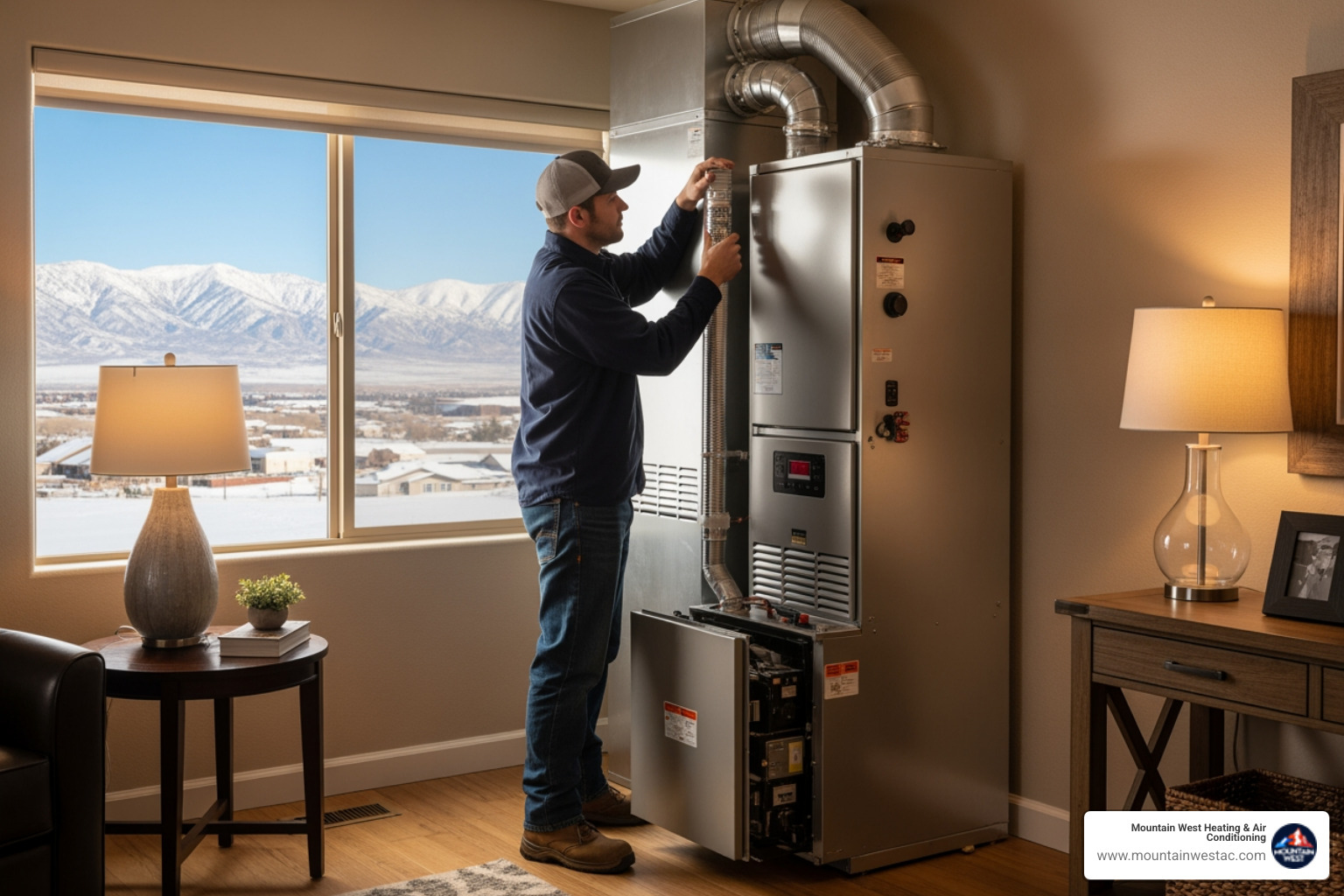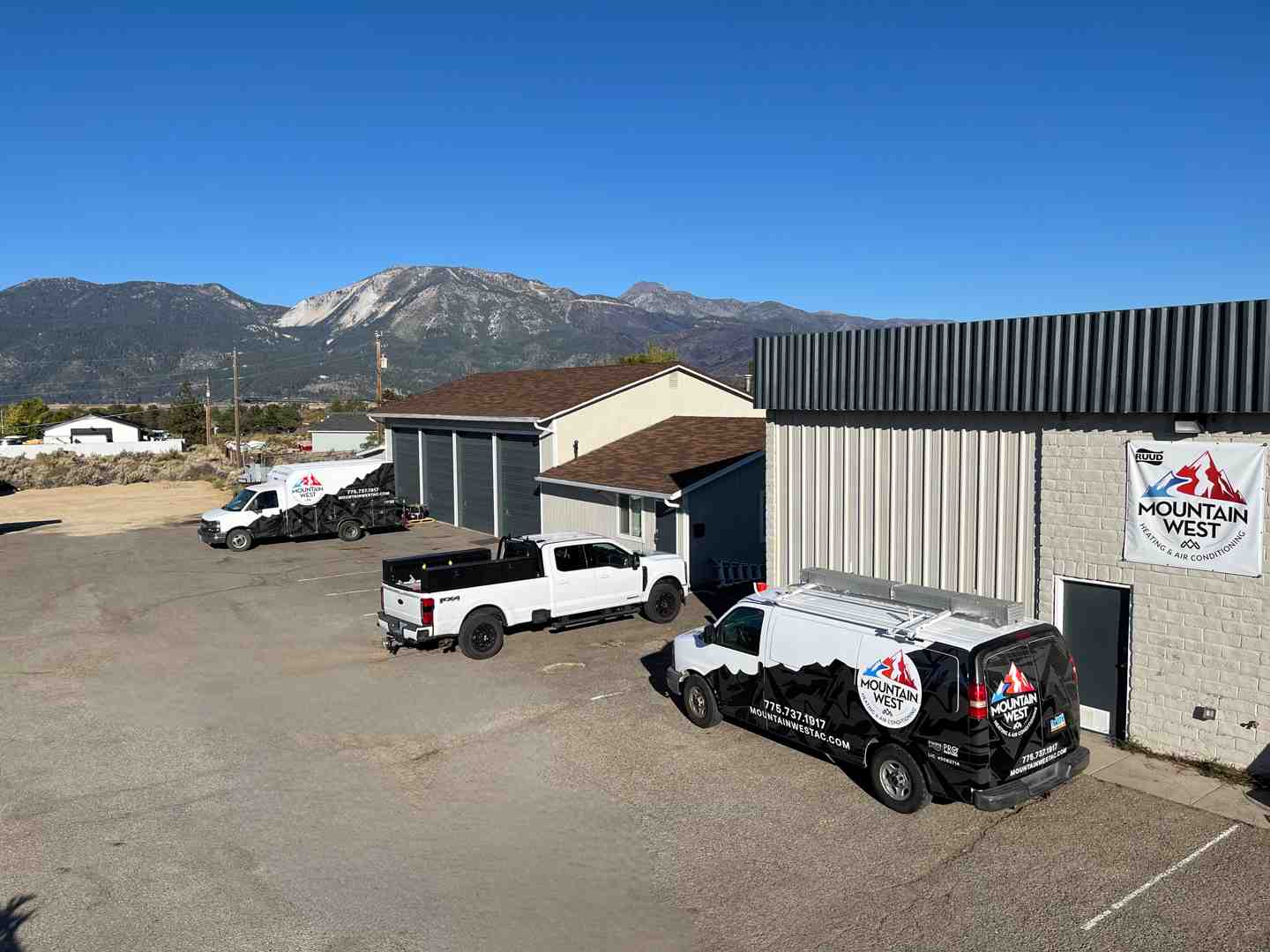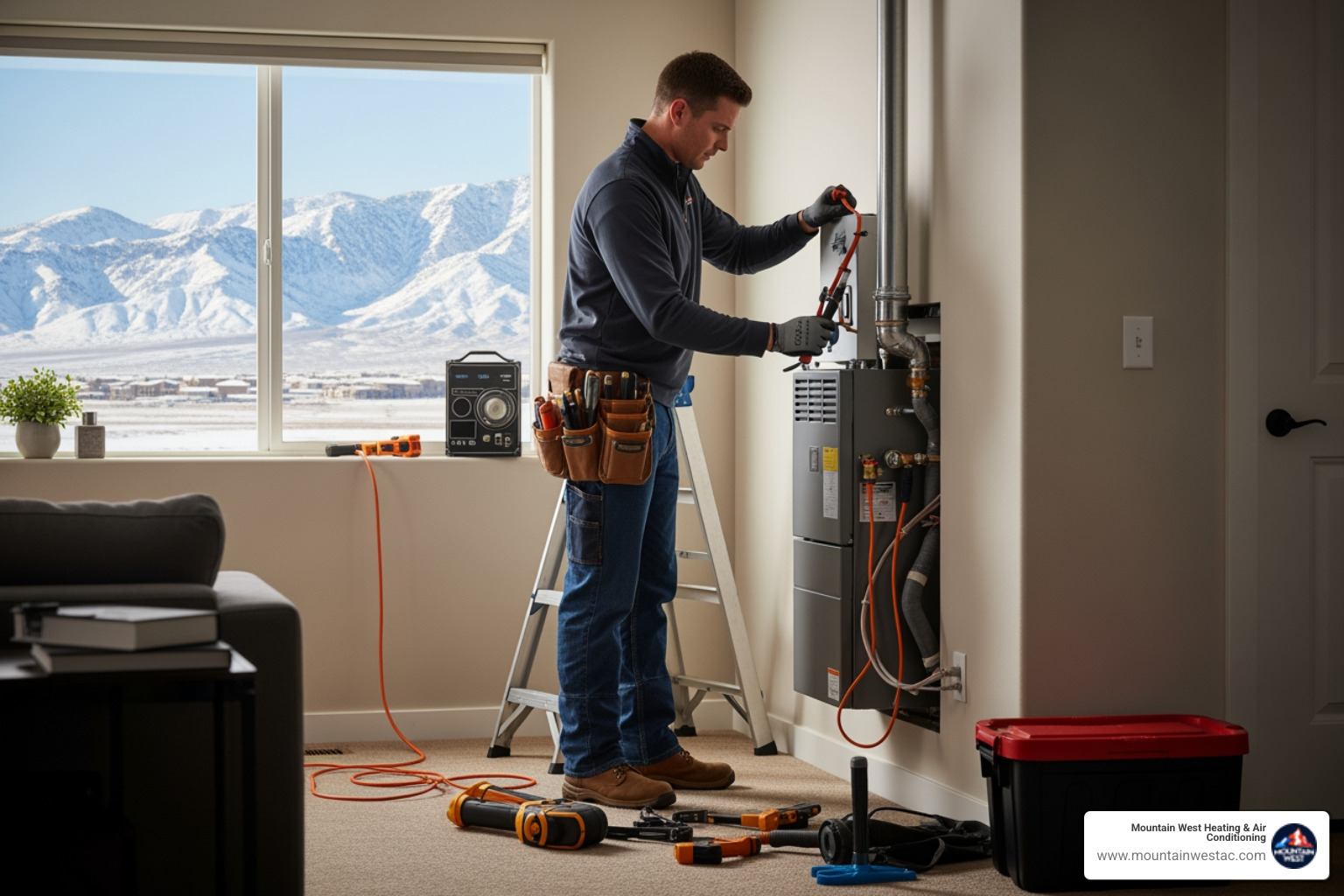Summer heat puts serious stress on your air conditioning system, and without proper maintenance, you could face expensive breakdowns and sky-high energy bills. A professional summer AC tune-up can prevent unexpected system failures while reducing your energy costs by hundreds or even thousands of dollars each year.
Many homeowners wait until their AC stops working to call for help, but this reactive approach often leads to emergency repair costs and uncomfortable days without cooling.
We understand that maintaining your HVAC system might seem like an unnecessary expense, especially when everything appears to be working fine. However, regular tune-ups catch small problems before they become major issues that require costly repairs or full system replacements.
Your AC works harder during summer months than any other time of year, making preventive maintenance crucial for keeping your home comfortable.
The good news is that professional AC maintenance doesn't require major home renovations or massive investments. Simple tune-up procedures performed by qualified technicians can significantly improve your system's efficiency, extend its lifespan, and keep your family cool all summer long while protecting your wallet from surprise repair bills.
In this article, you’ll learn why a summer AC tune-up is essential for boosting cooling efficiency, lowering energy bills, and preventing costly breakdowns.
Here’s what you need to know:
- Why a summer AC tune-up is essential
- What's included in a professional ac tune-up
- How much does a summer AC tune-up cost?
- When and how to schedule your HVAC summer tune-up
- AC maintenance with Mountain West
Let's dive in!
Why a summer AC tune-up is essential
A summer AC tune-up delivers three critical benefits that directly impact your comfort and wallet. Regular seasonal maintenance boosts your system's performance, cuts monthly energy costs, and stops expensive breakdowns during peak cooling season.
How AC maintenance improves system performance
When we perform seasonal maintenance, your AC system runs at peak efficiency. Clean air filters allow proper airflow through the unit. Dirty filters force your system to work harder and use more energy.
Key maintenance tasks that boost performance:
- Replace or clean air filters
- Clean evaporator and condenser coils
- Check refrigerant levels
- Inspect electrical connections
- Lubricate moving parts
Dirty coils reduce your system's ability to remove heat from your home. This makes rooms feel warmer even when the AC runs constantly.
Clean coils transfer heat better. Your home cools faster and stays comfortable longer.
We also check that all parts move smoothly. Worn belts or dry bearings create friction that wastes energy. Fresh lubrication keeps everything running quietly and efficiently.
The impact of tune-ups on monthly energy costs
Preventative maintenance directly reduces high energy bills throughout summer. A well-tuned AC uses 15-20% less electricity than a neglected system.
ENERGY STAR states that properly maintained and energy-efficient HVAC systems can reduce annual household energy costs by 10–30%, which can translate to approximately $140 or more per year.
How tune-ups cut energy costs:
- Clean systems run shorter cycles
- Proper refrigerant levels prevent overworking
- Sealed ducts stop cool air from escaping
- Calibrated thermostats maintain accurate temperatures
Your AC works hardest when components are dirty or damaged. A clogged filter makes the fan motor use extra power. Low refrigerant forces the compressor to run longer cycles.
Regular maintenance fixes these problems before they spike your electric bill. Clean components move air easily and cool your home faster.
Most homeowners save $200-400 per summer after a professional tune-up. The service pays for itself through lower monthly energy costs.
Preventing midsummer breakdowns before they start
Summer AC breakdowns happen when small problems turn into major failures. Preventative maintenance catches these issues early when repairs cost less.
According to the U.S. Environmental Protection Agency (EPA), every dollar invested in preventive maintenance can return up to $4 in savings by avoiding costly repairs or premature system replacements.
Common problems we find during tune-ups:
- Worn fan belts ready to snap
- Loose electrical connections
- Low refrigerant from small leaks
- Dirty coils causing overheating
- Blocked drain lines
Most AC failures occur on the hottest days when systems work hardest. A small refrigerant leak becomes a complete breakdown when temperatures hit 95 degrees.
Emergency repairs during summer cost 2-3 times more than scheduled maintenance. You also pay premium rates for after-hours service calls.
HVAC reliability improves dramatically with annual tune-ups. We replace worn parts before they fail and spot problems while they are easy to fix.
Regular maintenance extends your AC's lifespan by 5-10 years. This saves thousands compared to early replacement costs.
What's included in a professional ac tune-up
A professional AC tune-up covers three main areas: checking filters, refrigerant levels, and airflow patterns, calibrating your thermostat and testing all system controls, and performing a complete HVAC inspection of your cooling system.
Key checks for filters, refrigerant, and airflow
Air filters are the first thing we inspect during a tune-up. Dirty filters block airflow and make your system work harder.
We replace or clean filters based on their condition. Clean filters improve air quality and reduce energy costs.
Refrigerant levels get checked next. Low refrigerant means poor cooling and higher bills.
Our professional HVAC technician uses gauges to measure refrigerant pressure. We add refrigerant if levels are low and check for leaks.
Airflow testing happens throughout your home. We measure air coming from each vent to find blocked areas.
Common airflow problems include:
- Blocked return vents
- Dirty coils
- Fan motor issues
- Duct leaks
We clean evaporator and condenser coils during this step. Dirty coils reduce cooling power by up to 30%.
Calibrating your thermostat and testing system controls
Thermostat calibration ensures accurate temperature readings. A thermostat that's off by just 2 degrees wastes energy.
We test your thermostat at different temperature settings. We check both heating and cooling modes to make sure they switch properly.
System controls include safety switches, contactors, and electrical connections. We test each component to prevent breakdowns.
Our technician inspects:
- Start capacitors
- Control boards
- Safety switches
- Wire connections
We tighten loose electrical connections and replace worn parts. Faulty electrical components cause most AC breakdowns.
What a thorough HVAC summer tune-up should cover
A complete HVAC inspection goes beyond basic checks. We examine your entire cooling system from top to bottom.
Motor performance gets tested under normal operating conditions. We check belt tension and lubricate moving parts.
We inspect ductwork for leaks or damage. Leaky ducts waste up to 20% of your cooled air.
Drain lines get cleared to prevent water backup. Clogged drains can cause water damage to your home.
Our checklist includes:
Component
What We Check
Blower motor
Speed and noise levels
Condensate drain
Clear flow and proper drainage
Refrigerant lines
Insulation and leak signs
Outdoor unit
Coil cleaning and fan operation
We measure system performance before and after the tune-up. You'll see exactly how much we improved your AC's efficiency.
How much does a summer AC tune-up cost?
AC tune-up costs typically range from $70 to $200 in most areas, with Northern Nevada pricing falling within similar parameters. Understanding what's included in basic maintenance versus full service helps homeowners make informed decisions, especially when applying the $5000 repair rule.
Understanding average pricing in Northern Nevada
HVAC tune-up cost in Northern Nevada generally falls between $80 and $180 for standard residential units. Most local contractors charge around $120 to $150 for comprehensive seasonal maintenance.
Several factors influence average pricing in our region:
• Unit size and type - Larger systems or heat pumps cost more • Accessibility - Hard-to-reach units increase labor time • System age - Older units may require additional attention • Service provider - Established companies often charge premium rates
We typically see higher prices during peak summer months when demand increases. Scheduling tune-ups in spring or fall can save 10-20% on service costs.
Annual maintenance plans offer better value at $150 to $300 per year. These contracts usually include two visits and priority scheduling during emergencies.
What's included in tune-up vs. full AC service
Basic tune-ups focus on preventive maintenance tasks. Standard services include filter replacement, coil cleaning, refrigerant level checks, and electrical connection inspection.
Typical tune-up includes:
- Clean condenser and evaporator coils
- Replace or clean air filters
- Check refrigerant levels and pressures
- Inspect electrical connections and controls
- Lubricate moving parts
- Test thermostat operation
Full AC service goes beyond basic maintenance. This comprehensive approach costs $200 to $400 but addresses potential problems before they cause breakdowns.
Full service adds diagnostic testing, ductwork inspection, and minor repairs. We recommend full service every 2-3 years for optimal system performance.
How the $5000 AC rule factors into repair decisions
The $5000 AC rule helps homeowners decide between repair and replacement. If repair costs exceed $5000 or the unit is over 10 years old, replacement often makes more financial sense.
Regular tune-ups prevent many expensive repairs. Small issues caught early rarely escalate into major $2000+ problems that trigger replacement decisions.
This rule becomes crucial during emergency breakdowns. When faced with a $3000 compressor repair on a 12-year-old system, the $5000 threshold suggests replacement is wiser.
We use this guideline to help customers make repair vs replacement decisions. Consistent maintenance extends system life and delays these costly choices by 3-5 years.
When and how to schedule your HVAC summer tune-up
Proper timing and planning make the difference between a smooth summer and costly breakdowns. We recommend scheduling before peak demand and watching for key warning signs that indicate your system needs attention.
Ideal timing before peak summer heat hits
Spring scheduling offers the best results. We suggest booking your tune-up between March and May, well before temperatures climb above 80°F consistently.
Early scheduling helps you avoid the summer rush. HVAC companies get busy once heat waves start, making appointments harder to get.
April is the sweet spot for most regions. Your system has been off for months, and technicians can spot problems before you need cooling daily.
Here's our recommended timeline:
- March: Schedule your appointment
- April-May: Complete the tune-up
- June: Enjoy worry-free cooling
Waiting until June or July creates risks. If we find major issues during peak season, repair parts take longer to arrive and costs increase.
Signs your AC is overdue for a tune-up
Rising energy bills signal trouble. If your electric costs jumped 15% or more compared to last summer, your system is working too hard.
Weak airflow from vents means filters are clogged or fans need cleaning. You should feel strong, cool air within minutes of turning on your AC.
Strange noises like grinding, squealing, or banging indicate worn parts. These sounds often start small but lead to expensive repairs if ignored.
Uneven cooling throughout your home suggests ductwork problems or refrigerant issues. Some rooms shouldn't be 5-10 degrees warmer than others.
Frequent cycling where your AC turns on and off every few minutes wastes energy and strains components.
Musty odors from vents indicate mold growth in your system, which affects air quality and health.
Benefits of recurring maintenance plans
Annual contracts save money and guarantee service. Most HVAC companies offer maintenance plans that cost $150-300 per year and include two visits.
Priority scheduling means we fit you in first during busy periods. Plan members get faster service when emergencies happen.
Discounted repairs typically range from 10-20% off standard rates. These savings add up quickly on major fixes.
Extended warranties often come with maintenance plans. Some manufacturers require annual service to keep coverage valid.
Performance tracking helps us spot trends over time. We keep detailed records of your system's condition and recommend upgrades when needed.
Automatic scheduling eliminates the need to remember appointments. We contact you each season to set up your visit.
AC maintenance with Mountain West
Mountain West delivers comprehensive AC maintenance across Reno, Sparks, and Northern Nevada through our systematic tune-up process and commitment to honest, pressure-free service. We focus on thorough inspections, transparent communication, and building long-term customer relationships.
What makes our tune-up process reliable and thorough
Our qualified technicians follow a detailed 15-point inspection checklist for every AC tune-up. We check refrigerant levels, clean condenser coils, and test electrical connections to ensure peak performance.
Our comprehensive tune-up includes:
- Air filter replacement and airflow testing
- Thermostat calibration and settings check
- Drain line cleaning and leak inspection
- Motor lubrication and belt adjustment
- Safety control testing
We document all findings and provide you with a detailed report. This helps you understand your system's condition and any potential issues before they become expensive problems.
Each technician carries diagnostic tools to measure system efficiency accurately. We test temperature differentials and check for unusual noises or vibrations that could signal future breakdowns.
Serving Reno, Sparks, and Northern Nevada with trusted care
We have served Northern Nevada homeowners for over 20 years. Our local knowledge helps us understand the unique challenges that desert heat brings to AC systems.
Our service area covers:
- Reno - Downtown, Midtown, and surrounding neighborhoods
- Sparks - Victorian Square, Spanish Springs, and Pyramid Lake areas
- Carson City - Complete metro area coverage
- Fernley and other Northern Nevada communities
We maintain fast response times across our entire service territory. Most tune-up appointments can be scheduled within 48 hours during peak season.
Our technicians live and work in these communities. We understand local climate patterns and how they affect your cooling system's performance throughout the summer months.
Transparent pricing, expert service, and zero upsell pressure
We provide upfront pricing before any work begins. Our tune-up service costs are clearly outlined with no hidden fees or surprise charges.
What you can expect:
- Fixed pricing for standard tune-up services
- Written estimates for any additional repairs needed
- No pressure tactics or inflated recommendations
- Honest assessments of your system's condition
Our customer service approach focuses on education rather than sales. We explain what we find during inspections and help you make informed decisions about your AC system.
If we discover issues during your tune-up, we present options with clear explanations. You decide what repairs fit your budget and timeline without any pressure from our team.
Conclusion
We've seen how a summer AC tune-up delivers real benefits for your home and wallet. Regular maintenance keeps your system running at peak performance when you need it most.
The small cost of annual maintenance prevents much larger expenses down the road. A broken AC system during peak summer can cost thousands to replace or repair.
Spring scheduling works best for tune-ups. This timing lets technicians catch problems before the heat arrives. Your system will be ready when temperatures climb.
Professional tune-ups include cleaning, inspections, and adjustments we can't do ourselves. Technicians check refrigerant levels, electrical parts, and airflow to optimize performance.
We recommend finding a trusted HVAC company for yearly service. Many offer maintenance plans that include tune-ups and priority service calls.
Taking action now protects your comfort and budget all summer long. A well-maintained AC system runs more efficiently and lasts longer than one that's neglected.
Schedule your summer AC tune-up with our certified Northern Nevada HVAC technicians today to ensure reliable cooling and lower energy costs.









